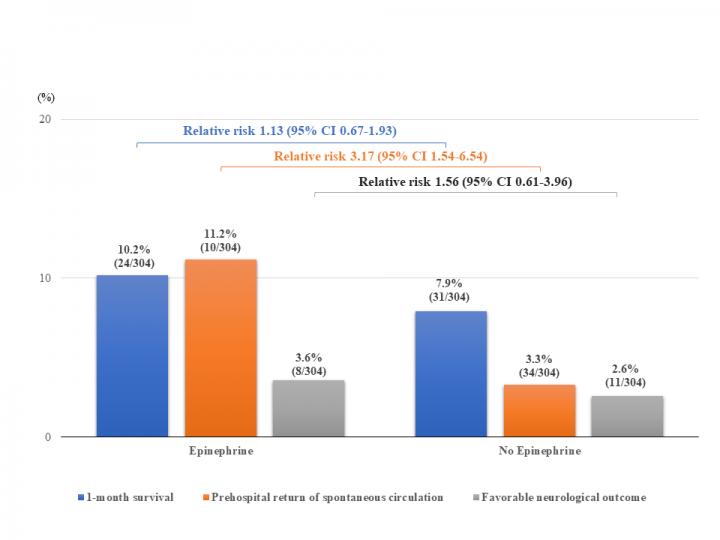An international team of researchers led by Osaka University find that prehospital administration of epinephrine could result in a more favorable outcome for pediatric patients following out of hospital cardiac arrest

Credit: Osaka University
Osaka, Japan – A loved one suffering cardiac arrest is an emotionally stressful time for families, but never more so than when the patient is a child. The very real potential for loss of life in these situations means that the way in which emergency responders treat out of hospital cardiac arrest (OHCA) becomes even more crucial when dealing with pediatric patients.
Studies in adults have suggested that early administration of epinephrine results in more favorable outcomes for patients following cardiac arrest. Epinephrine, or adrenaline as it is more commonly known, is a hormone that increases diastolic pressure, essentially getting blood flowing again. However, there is conflicting evidence that epinephrine administration may in fact be detrimental, as it can also cause fatal arrhythmia in the heart, triggering further cardiac arrests.
Interestingly, although current international guidelines suggest that epinephrine be administered to pediatric OHCA patients with non-shockable rhythms–basically those cases where artificial defibrillation wouldn’t work–there is little evidence to either support or dispute its effectiveness.
In a study published in Journal of the American College of Cardiology, an international team of researchers addressed this knowledge gap by evaluating epinephrine use during resuscitation attempts in Japanese patients to better inform the development of guidelines for treatment of pediatric OHCA.
“We were concerned by the lack of randomized controlled trials and observational studies assessing the effectiveness of epinephrine administration in pediatric OHCA cases,” explains senior author of the study Tetsuhisa Kitamura from Osaka University’s Graduate School of Medicine. “To better assess the effects of prehospital epinephrine administration, we retrospectively analyzed data from 3,961 OHCA patients aged between 8 and 17 years from the nationwide All-Japan Utstein Registry of the Fire and Disaster Management Agency database.”
After excluding patients who did not meet the study criteria, the remaining epinephrine-treated patients were matched with patients who were candidates for epinephrine administration at the same timepoint during resuscitation but who did not receive treatment. The researchers then assessed the efficacy of epinephrine administration in the 304 patients and their matched controls based on 1-month survival and favorable neurological outcome.
“Our results showed that prehospital epinephrine administration was associated with improved return of circulation in pediatric patients with OHCA who did not respond to basic life support,” says Dr Kitamura. “While we did not see any significant improvement in 1-month survival rates as a result of prehospital epinephrine administration, the return of blood flow is a necessary step in achieving a favorable neurological outcome. Therefore, we recommend that prehospital epinephrine administration should be included in international guidelines for cardiopulmonary resuscitation to enhance the survival of pediatric OHCA patients.”
###
The article, “Pre-hospital administration of epinephrine in pediatric patients with out-of-hospital cardiac arrest,” was published in Journal of the American College of Cardiology at DOI: https:/
About Osaka University
Osaka University was founded in 1931 as one of the seven imperial universities of Japan and now has expanded to one of Japan’s leading comprehensive universities. The University has now embarked on open research revolution from a position as Japan’s most innovative university and among the most innovative institutions in the world according to Reuters 2015 Top 100 Innovative Universities and the Nature Index Innovation 2017. The university’s ability to innovate from the stage of fundamental research through the creation of useful technology with economic impact stems from its broad disciplinary spectrum.
Website: https:/
Media Contact
Saori Obayashi
[email protected]
81-661-055-886
Related Journal Article
http://dx.




